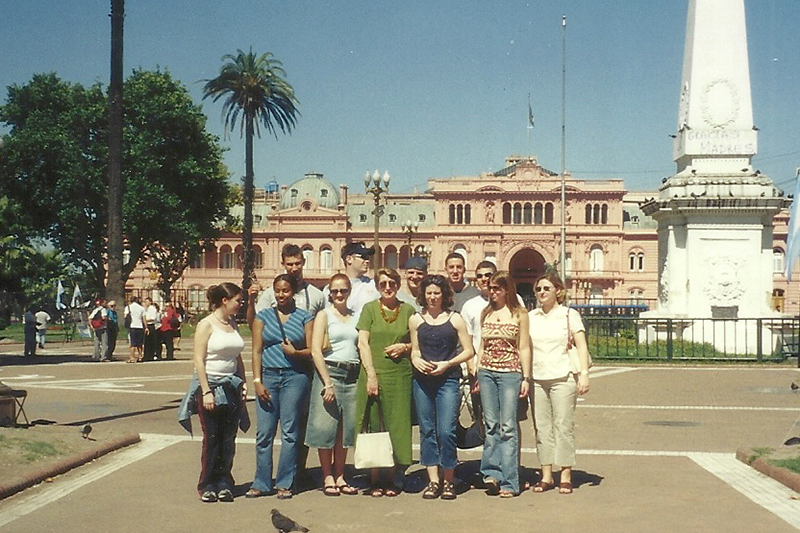


Home Again: Argentina
Photos courtesy of Krystyna Musik June 24, 2024
UD faculty member draws on personal experience to teach a pivotal time in Argentina’s history
Editor’s note: The Home Again series shares stories of University of Delaware faculty who have led study abroad programs to their home countries, offering unique perspectives and personal experiences to students.
Visiting the Evita Museum in Buenos Aires during a 2003 study abroad program in Argentina, University of Delaware faculty member Krystyna Musik wasn’t happy with how the tour guide talked about Eva Perón, sharing only positive views of the Argentinian icon and ignoring negative aspects of her complicated legacy.
“I told him, ‘You’re just telling us what you read in the books. I lived through it, so please move over,’” Musik said, taking it upon herself to instruct the student group. It wasn’t the only time during the program that Musik drew on her personal experiences to provide students with a deeper understanding of Argentine history and culture.
Musik, an instructor of Spanish, is one of three UD faculty members who have directed the most study abroad programs in University history, having led more than 30 programs to Chile, Spain, Costa Rica, Ecuador, Mexico and Greece. In 2015 she was named the Center for Global Programs and Services’ faculty director of the year.
In leading programs in Argentina, Musik offered perspectives on how governments do not always reflect the populations they represent, especially as she directly experienced the turbulence of Argentinian president Juan Perón’s first term.
“People are not their government or the politicians,” Musik said. “ I grew up in socialism, and I know how it really was. On paper it’s nice, but in reality it doesn’t work.”
Perón was an army colonel who became president of Argentina in 1946. He won a second term in 1952, was overthrown by a military coup in 1955, and was elected a third time in 1973, serving until his death in 1974.
His political ideology, Peronism, focused on economic nationalism and improving social benefits to the working class, yet his regime was also marked by corruption and harsh suppression of opposing views.
His influence continues today through the Justicialist Party, one of the country’s major political parties.
Perón and his wife, Eva, remain divisive figures in Argentina, both adored and reviled for their impact on the nation.
“I remember after Evita died [in 1952] I knew something was happening in the government because when I left home to go to school one morning, a soldier was driving the street car and another one stood in the back with a rifle,” Musik said. Later on, the family, who lived just a few metro stops from the Casa Rosada presidential palace, could hear bombs dropping as the military attempted to oust Perón.

This wasn’t the first time Musik’s family lived through a period of political volatility. Her parents were originally from Poland, in a part of the country that is now western Ukraine. When the Soviet army entered the country toward the end of World War II, the family was deported to Siberia before moving to Iran and then Lebanon, where Musik was born. They arrived in Argentina in 1948, and in 1963, when Musik was 16, the family immigrated to the United States in hopes of finding a more stable home.
“Argentina — that’s my home country. I’m Polish, but I didn’t grow up there. We spoke Polish at home, but I’m very Spanish in many respects,” Musik said.
Forty years later, Musik returned to Buenos Aires for the first time, leading a group of 11 students. The program had originally been scheduled to run in January 2002, but was canceled due to safety concerns after the “Argentinazo” events in December 2001. That month saw the worst economic crises in Argentina’s modern history, with violent riots throughout the country. When the program ran in 2003, students witnessed the aftermath of the crisis while also learning about the country’s volatile political history, including the lasting impact of Peronism.
“I never felt unsafe,” said Victoria Hamrick, who participated as a senior political science major. “Learning about the politics of developing countries was fascinating.”
Hamrick remembers another incident when Musik had zero tolerance for someone giving the students what she considered false information. The Mothers of Plaza de Mayo Association was formed in 1977 by women whose children were “disappeared” by the military dictatorship that ruled from 1976-1983. For nearly 30 years the group held regular protests demanding information about their loved ones and justice for the culprits.

Musik agreed to meet with Mercedes Colás, the association’s vice president, believing it would be good for the students to hear about the estimated 30,000 “disappeared,” but she became impatient and frustrated when Colás refused to answer questions and spouted anti-American propaganda.
“Senora Musik wasn’t having any of it. She said, ‘Kids, we’re leaving!’ and pointed at the door, and we all left,” Hamrick said.
For Hamrick, it was more interesting than upsetting.
“People in Buenos Aires are passionate people,” she said. “Any time they start talking politics they get all animated. It’s like a national sport. They’ve overcome a lot as a nation, and when we were there they were trying to move forward to do more for themselves and their citizens.”
Musik encouraged her students to engage in these conversations whether in class, meeting with representatives or while enjoying Buenos Aires’ cafe culture.
“I had intelligent students who had strong opinions but were eager to learn and enthusiastic to explore,” she said. “I was very proud of them.”
Contact Us
Have a UDaily story idea?
Contact us at ocm@udel.edu
Members of the press
Contact us at 302-831-NEWS or visit the Media Relations website

